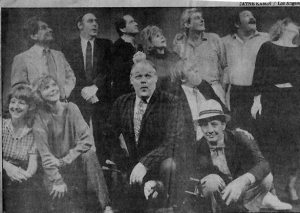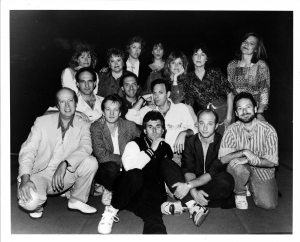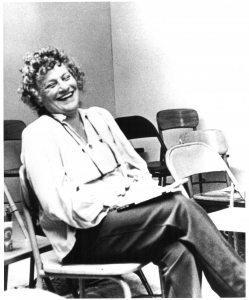 After 35 years of playing Spolin Games with various groups, I’ve noticed an interesting thing. I am struck by the fact that these groups as a result of playing together for an extended period keep in touch with each other and often come together to play as opportunity permits.
After 35 years of playing Spolin Games with various groups, I’ve noticed an interesting thing. I am struck by the fact that these groups as a result of playing together for an extended period keep in touch with each other and often come together to play as opportunity permits.
My first observation of this phenomenon was watching Sills & Company perform in Los Angeles in the early ’80s. The company of players, all alums of Second City and other workshops with Paul Sills and Viola Spolin decades earlier, came together at the request of director Paul Sills to perform for a few years at the Heliotrope Theater. Many of the players had played in the 60’s and 70’s in other Improv incarnations led by Sills. When asked to come back to play, all agreed instantly. Many of these players were successful working actors. Some were noted celebrities and all came back to play at a small east Hollywood theater – for relatively nothing.
When Paul Dooley, Richard Libertini, Richard Schaal, Valerie Harper, Gary Goodrow, Mina Kolb, Severn Darden, Avery Schrieber, Lewis Arquette and Hamilton Camp heard the call and came running to play once again with each other before being called to Broadway with their show for a run at the Lambs Theater. I would go regularly to the show to watch what I consider the best improvisation I’ve ever seen, played by some of the best players in the world. Often I would sit next to Viola Spolin, my teacher and friend and we would watch in awe and delight.
These players were not only part of a company, they were life-long friends. Their friendships formed in the early years of Second City as they forged a new American art form – Improvisation. I go to know many of them personally and they shared with me the fact that if Paul Sills (their director and mentor) called, they would always come back to be rejuvenated by the creativity generated by Spolin Games if they could. Success and money is one measure of success in Hollywood, but the joy of playing with fellow players is priceless and worth dropping back in to take a dip in the rejuvenating well of Improv.
Sills and Company is only one example of this phenomenon. In the 1940’s Viola had a small theater in Hollywood, the El Patio, and created a school and theater company she called the Young Actors Company. There she would teach young children the disciplines of theater through her theater games and produce wonderful plays all performed and crewed by her students. These shows were offered to the public not as children’s theater, but simply great entertainment for the general public. Two of her students from that period were Paul Sand and Alan Arkin, both who’ve been involved with improvisation throughout their illustrious careers. Many, of course did not choose show business as adult careers, but all were changed by their time with Spolin.
In 1980 they contacted each other from all over the country and planned and pulled off a surprise party for Viola on her 80th birthday. The connection and the influence of the games brought them together 40 years later. Several students have contacted me over the years to tell me that they continue to teach and play the games to this day.
 In my own career with Spolin Games, I played with and eventually ran workshops for the company of players that Sills and Company left behind at the Heliotrope. We played for a year, before the theater was sold. Two years later, one of the players, Pat Musick decided that for her 40th birthday, she would rent a theater and invite everyone back to play. I came back as did many of the old players. It was so much fun, that we would continue to do it and in 1988, the Spolin Players were born. We re-rented the Heliotrope theater and I ran workshops supervised by Viola Spolin, who would also sidecoach. They have been playing together, off and on and continue to play publicly to this very day. 24 years later.
In my own career with Spolin Games, I played with and eventually ran workshops for the company of players that Sills and Company left behind at the Heliotrope. We played for a year, before the theater was sold. Two years later, one of the players, Pat Musick decided that for her 40th birthday, she would rent a theater and invite everyone back to play. I came back as did many of the old players. It was so much fun, that we would continue to do it and in 1988, the Spolin Players were born. We re-rented the Heliotrope theater and I ran workshops supervised by Viola Spolin, who would also sidecoach. They have been playing together, off and on and continue to play publicly to this very day. 24 years later.
 More recently, in 2010, I ran an eight week class for 20 students in Redmond, WA. None of the students knew each other and all came as individuals to study with me. Over a dozen asked me after the series of workshops were over if I would continue for another eight weeks. I agreed and then the request came for another eight weeks and another. This group of people, from different walks of life and I have now become dear friends who throw parties for each other, and see each other socially outside of class. To date, there is no sign of them wanting to stop playing and we have delved deep into Spolin’s work over the last two years.
More recently, in 2010, I ran an eight week class for 20 students in Redmond, WA. None of the students knew each other and all came as individuals to study with me. Over a dozen asked me after the series of workshops were over if I would continue for another eight weeks. I agreed and then the request came for another eight weeks and another. This group of people, from different walks of life and I have now become dear friends who throw parties for each other, and see each other socially outside of class. To date, there is no sign of them wanting to stop playing and we have delved deep into Spolin’s work over the last two years.
What makes these groups want to come back at any opportunity to play and perform? The games and the philosophy of peerage, fun, and transformation that Spolin Games produces keep them coming back for more. And what is better than having adult playmates to have fun with and go exploring the unknown in an effort to grow and learn and be refreshed and experience the joy of playing?
Nothing, that’s what! In my mind it’s what life is all about.
Gary Schwartz
Dec. 2012 North Bend WA
